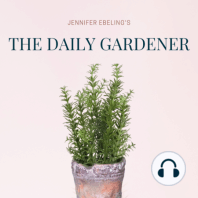10 min listen

February 10, 2020 Midwinter Trees, Plant Health Resolutions, Jan Gronovius, Benjamin Smith Barton, Winifred Mary Letts, Jack Heslop-Harrison, Snow Poe…
February 10, 2020 Midwinter Trees, Plant Health Resolutions, Jan Gronovius, Benjamin Smith Barton, Winifred Mary Letts, Jack Heslop-Harrison, Snow Poe…
ratings:
Length:
29 minutes
Released:
Feb 10, 2020
Format:
Podcast episode
Description
Today we celebrate the man who suggested naming the Twinflower for Linnaeus and the botanist who gave Meriwether Lewis a crash course in botany. We'll learn about the English writer who wrote, that, "God once loved a garden we learn in holy writ and seeing gardens in the spring, I well can credit it." And we also tip our hats to the British botanist who loved the common spotted orchid. Today's Unearthed Words feature words about the white stuff covering our gardens right now: snow. We Grow That Garden Library™ with a book about a family who settled in the Florida frontier. The book was honored as the "Most Outstanding Florida Historical Novel." I'll talk about a tool that will help you spruce up a number of items in your garden (I love these things!) and then we'll wrap things up with a pioneer naturalist who wrote books that became a beloved part of many modern childhoods. But first, let's catch up on a few recent events. Subscribe Apple|Google|Spotify|Stitcher|iHeart Curated Articles Alan Titchmarsh: The stunning midwinter trees whose bark is better than their bite - Country Life Here's a great post by Alan Titchmarsh in Country Life about the fabulous book Winter Gardens by Cedric Pollet. Pollet is a shutterbug who captures plants in their dormancy: "the best varieties of dogwoods, willows, maples, and birches, plus a smattering of brambles and bamboos." "We are none of us too old to discover new plants and new ways of using them." Plant health resolutions: Pippa Greenwood Botanist and broadcaster @PippaGreenwood wants to see more funding for research into pests and pathogens, and the breeding of plants better able to resist new diseases. "You could say that plant health is the most important thing – we, as the human race, cannot survive long-term without plants; in fact, we couldn't survive for long at all. Plants are fundamentally important to everything. Increased movement of people, food, and other goods has played a significant part in the spread of pests and pathogens, often with a very serious impact on plant health. Quite simply, we have to take steps to ensure plant health is seen as a top priority." Now, if you'd like to check out these curated articles for yourself, you're in luck, because I share all of it with the Listener Community in the Free Facebook Group - The Daily Gardener Community. There's no need to take notes or search for links - the next time you're on Facebook, search for Daily Gardener Community and request to join. I'd love to meet you in the group. Important Events 1686 Today is the birthday of the Dutch botanist Jan Gronovius. Gronovius's story is inextricably bound to the Virginia botanist John Clayton. Clayton botanized Virginia. In the early 1700s, Clayton sent specimens to Gronovius both directly and indirectly through the English naturalist Mark Catesby. Gronovius was a little in over his head as he attempted to make sense of the overwhelming amount of specimens from Clayton. So, he did what most of us would do; he asked for help - and he got it from Carl Linnaeus. In a brazen move, Gronovius used Clayton's specimens and documentation to put together a Flora of Virginia in 1739. He published the work without notifying Clayton, and he certainly didn't seek his permission before he started the endeavor. Other than the Clayton situation, Gronovius is remembered for the many plants that he named. After seeing the Twinflower, it was Gronovius who suggested naming the plant after Linnaeus. Without Gronovius, Linnaeus probably wouldn't have had a plant named for him during his lifetime; Linnaeus was very modest. And, bless his heart, Gronovius was sensitive to Linnaeus's need to keep the honorary naming low key. So Gronovius wrote that, "[The Twinflower was] "a plant of Lapland; lowly, insignificant, disregarded, flowering but for a brief space - after Linnaeus who resembles it." Thus, the Twinflower is the only plant named for the Father of Taxonomy, Linnaeus, and has the botanica
Released:
Feb 10, 2020
Format:
Podcast episode
Titles in the series (100)
May 2, 2019 Plant Sales, May Fools Day, Rivdan, The White House Gardens Symposium, Jimi Hendrix, Stonewall Jackson, Didier Decoin, Dividing Iris, and The Enid A. Haupt Garden: Ah May... the Month of Plant Sales. When I started gardening, I would Plant Sale away my Saturdays in May with my dear friend Judy. We would plan our way to a successful sale day, waking up while it was still dark out. Then... by The Daily Gardener